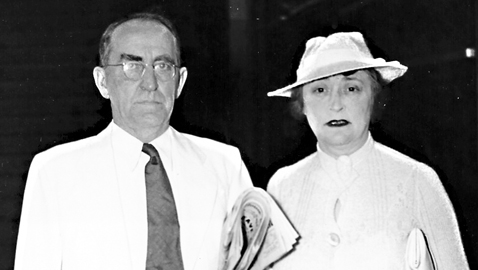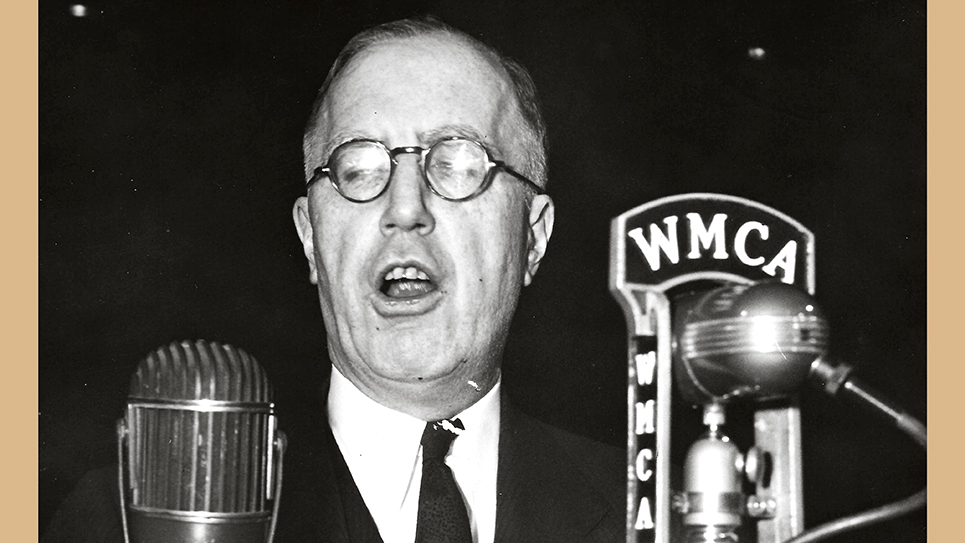
From the author’s personal collection.
Congressman and Mrs. William B. Bankhead attending the funeral of Speaker Joseph W. Byrns, 1936
For decades, one of the most politically and socially prominent families in Alabama were the Bankheads. John H. Bankhead was both a Congressman and senator from Alabama; his children would all occupy important posts in the state. His son and namesake, John H. Bankhead, II would be a senator from Alabama; daughter, Marie, would become the head of the Alabama State Archives; and son, Will, would be elected to Congress and rise to become Speaker of the House. Granddaughter, Tallulah, would become an actress and infamous.
William Brockman Bankhead, named for his mother Tallulah Brockman’s side of the family, was born on April 12, 1874. At the time of Will’s birth, his father was a member of the Alabama legislature. Will was born on the Bankhead plantation and enjoyed a pleasant childhood. He attended the University of Alabama, as had his brother, John (whose roommate was future senator Kenneth D. McKellar of Tennessee). He went to Georgetown University where he earned his law degree. By 1898, Will Bankhead was the city attorney for Huntsville, Alabama. In 1900, Will married Adelaide Eugenia Sledge and the couple had two daughters, Eugenia and Tallulah. Tragedy was not far behind the births, as Mrs. Bankhead contracted blood poisoning and died in 1902. Left with two very young daughters, Will Bankhead suffered through the loss of his wife and his family members helped to raise his children. The Bankhead daughters were largely raised by their grandparents and spent considerable time with their Aunt Marie and her husband, Thomas Owen. Yet, both daughters, especially Tallulah, adored their father.
Will Bankhead had been elected to the Alabama legislature in 1900, the same year he married. He was reelected in 1902, but did not seek reelection, perhaps because of the death of his wife. Bankhead moved his family to Jasper, where he built an impressive brick home, which still stands today. Will was the prosecutor for Jasper from 1910 until 1914, when he made his first race for Congress. Will was unsuccessful in his first Congressional campaign, but he ran for and won in 1916 in a newly redistricted seat. Will Bankhead would remain in Congress for the rest of his life.
Will Bankhead remarried in 1914, taking as his bride Florence McGuire. The new Mrs. Bankhead helped the future Speaker with his daughters, although the children did not see their father all that more frequently.
Bankhead came to Congress as Woodrow Wilson was reelected to a second term on the slogan, “He Kept Us Out of War”. Wilson was especially popular in the South and although he had been governor of New Jersey, the president had been born in Virginia and many Southerners looked upon him as their own. Congressman Bankhead was strongly supportive of Wilson and his administration.
The Bankhead family’s prestige received a blow in 1926 when John sought to be elected United States senator, but lost to lawyer Hugo Black. The Ku Klux Klan was reaching its peak of influence in Alabama that year and candidates supported by the KKK won both the governorship and the Senate seat. In fact, both Bibb Graves and Hugo Black, the winning candidates, were reputedly members of the Klan.
Alabama politics was turned on its head in 1928 when Al Smith, governor of New York, was nominated to run for president. Smith was dripping wet and an Irish Catholic, which set off a firestorm in much of the South. Congressman William Bankhead gave Smith a strong endorsement, but the political establishment in Alabama was stunned when Senator J. Thomas Heflin, a remarkably adept demagogue who raised the issue of the Pope ruling America through Smith in the White House. Heflin, an able and entertaining speaker, bolted the party to oppose Smith. Alabama had been a thoroughly Democratic state since Reconstruction, yet the political establishment had to work hard to keep the Yellowhammer State in the Democratic column. They were successful, but only just barely.
Heflin suffered for his political apostasy. Following the election, the State Democratic Committee changed the party rules requiring every nominee to be someone who had supported the ticket in 1928. Heflin, who faced reelection in 1930, was suddenly ineligible to seek the Democratic nomination. John Bankhead was running for the Senate once again and Heflin had to run in the general election as a “Jeffersonian Democrat.” John Bankhead, II was elected and joined brother Will in Washington, D. C.
Senator John Bankhead concentrated on agricultural matters as a member of the Senate and brother Will did the same, both of them intent on passing legislature that would aid the farmers of Alabama. Will sponsored the Bankhead Cotton Control Act, which was designed to help cotton farmers. Both Bankhead brothers were appalled when the United States Supreme Court struck down the Agricultural Adjustment Act as unconstitutional in 1936. The worst was yet to come, as a majority of Congress worried the Bankhead Act might also be deemed unconstitutional and repealed the law.
Far more pleasant for Will Bankhead was his own personal standing in Congress. Bankhead had been elected Majority Leader when Tennessee’s Joseph W. Byrns had succeeded the late Henry T. Rainey as Speaker of the House in 1934. Bankhead faced seven other candidates for the Majority Leader’s post, but Senator Joseph F. Guffey of Pennsylvania, the “boss” of the Democratic Party in that state, rounded up twenty-three Congressmen to support the future Speaker. With the pledge of support from the united Pennsylvania delegation, Will Bankhead was elected.
Bankhead did not remain Majority Leader long. Byrns died in early in the summer of 1936 and Will Bankhead became Speaker of the House.
As Speaker Bankhead assumed the rostrum, economic issues became less important than foreign policy matters. President Roosevelt, along with many other Americans, watched anxiously at events unfolding in Europe. There was powerful isolationist sentiment in Congress, as well as the rest of the country. Some of the most powerful members of Congress were staunch isolationists. Burton K. Wheeler, the progressive Democrat from Montana, had led the fight against FDR’s plan to pack the Supreme Court and was a fierce isolationist. So was David I. Walsh, the first Irish Catholic ever to be elected governor and senator from Massachusetts. Being of Irish descent, Walsh was wary of the British Empire. Worse still for internationalists, Walsh was the Chairman of the Senate’s Naval Affairs Committee. Isolationism was not confined to one political party; some of the most senior Republican senators were profoundly against American involvement in European affairs. Senator Hiram W. Johnson of California and Senator William E. Borah of Idaho, both members of the Senate’s Foreign Relations Committee, were isolationists.
Indiana Congressman Louis Ludlow, a Democrat, was promoting an amendment to the Constitution that would require a national referendum before the United States could go to war. Speaker Bankhead had to use all his political skills and powers of persuasion to stop the Ludlow amendment from passing the House of Representatives. Bankhead also opposed the Neutrality Act in 1937, promoted by isolationist members of Congress, as he believed it would impede America’s abilities to navigate the currents of global policy, particularly with the increasing aggression of the German and Italian governments. Italy’s Mussolini had invaded Ethiopia in 1935 and his troops, well equipped with modern weapons, and slaughtered thousands of Ethiopians armed with little more than spears. Hitler had annexed part of Czechoslovakia and all of Austria. The Munich summit between Hitler, Mussolini, Great Britain’s Neville Chamberlain, and France’s Edouard Daladier did not produce peace in our time; rather, it put off the inevitable. Hitler’s appetite for additional territory was only momentarily appeased.
President Roosevelt summoned Congress back in special session in 1939 to consider amending the Neutrality Act to allow foreign governments to buy arms and supplies from the United States, if they had the cash to do so. Isolationists hotly fought the “cash and carry” provision of the bill, but Speaker Bankhead was able to pass the amendment through the House.
The following year, Speaker Bankhead suffered perhaps the worst disappointment of his long political career. It was clear Vice President John Nance Garner would be dropped from the Democratic ticket and Bankhead wanted to succeed him. The 1940 Democratic National Convention was one of the more contentious gatherings of Democrats and FDR was playing a risky game, refusing to announce he wanted a third term and waiting to be “drafted” by his party. Democrats feared an election without FDR at the top of the ticket and sat bewildered when an announcement was read to the assemblage that seemed to indicate the president would not run again. Suddenly, a robust voice bellowed through the audio system, “WE WANT ROOSEVELT!” Chicago Mayor Edward Kelly had stationed his superintendent of sewers in the bowels of the convention hall and that loud voice repeated the chant, which was taken up by the delegates. Franklin Delano Roosevelt received his draft.
Bankhead was the keynote speaker at the 1940 Democratic National Convention and unlike so many of his brethren from the South, he was no spellbinder. In fact, his keynote address was somewhat dismal. One author went so far as to describe Bankhead’s speech as “mind numbing.”
Will Bankhead was hardly the only Democrat in the country who wanted to be vice president; there were a host of eager Democrats wanting to run. In fact, it seemed there was hardly anyone who didn’t want to be vice president. When FDR announced his own choice as his running mate, Democrats were stunned. Roosevelt had selected Secretary of Agriculture Henry A. Wallace to run for vice president. Wallace had never once been elected to any office and had been a Republican most of his life. The convention was growing ugly and delegates loudly booed every mention of Wallace’s name, causing Mrs. Wallace to burst into tears and plaintively ask, “Why are they booing my Henry?”
When Roosevelt made his choice of Henry A. Wallace known, most of the announced candidates for the vice presidential nomination dutifully withdrew their names. Will Bankhead, furious, refused to do so. The delegates were on the verge of rebellion and President Roosevelt, advised of the situation in Chicago, actually drafted a statement declining the presidential nomination. Roosevelt told one friend if the convention rejected Wallace, they could nominate someone else for president. Senator James F. Byrnes of South Carolina, one of the Roosevelt spokesmen, scurried about the convention floor angrily demanding, “Do you want a vice president, or do you want a president?”
The situation was so bad, FDR dispatched his wife, Eleanor, whose presence had precisely the effect the president had hoped. Mrs. Roosevelt’s speech seems to calm the delegates, although Speaker Bankhead persisted with his own candidacy. Bankhead won the South, but little else and Henry A. Wallace was nominated.
Senator John Bankhead made the motion to make Wallace’s nomination unanimous and while the Bankheads loyally supported the Democratic ticket, it was a bitter pill for them to swallow.
Will Bankhead was in precarious health and had been for some time. His vice presidential aspirations were not reasonable in light of his delicate health. For several years, Bankhead had been described as “sickly” by members of the national press. Bankhead had missed the opening of the 74th Congress when he had to be taken to Bethesda Naval Hospital, reportedly suffering from a heavy cold and indigestion. Tallulah Bankhead flew to her father’s side and complained, “Daddy just won’t take care of himself.”
Bankhead had been ill so often during his time as Majority Leader, many of his responsibilities were handled by Congressman John J. O’Connor of New York, Chairman of the House Rules Committee. Congress had remained in session much of the summer of 1940 and the Washington heat and humidity had taken a toll on Will Bankhead.
The Speaker’s ill health became readily apparent when Bankhead returned to Chicago, where he was to give a speech on behalf of the Roosevelt – Wallace ticket, which was to be carried over the radio. Bankhead was found unconscious in his hotel suite, his speech cancelled, and he was rushed back to Washington, D. C. The Speaker had suffered from a serious stomach hemorrhage.
Bankhead’s daughter Tallulah frantically hurried to his side, but the Speaker slipped away before she could join him. Will Bankhead died September 15, 1940.






